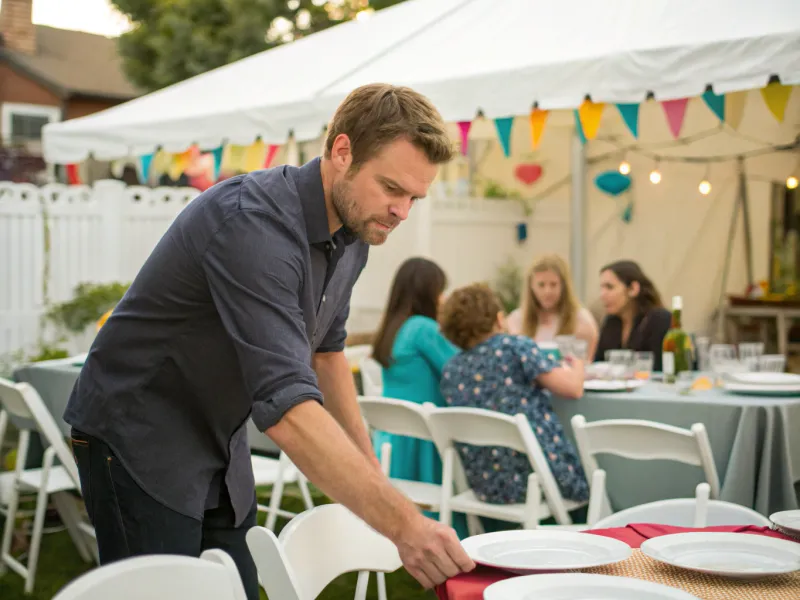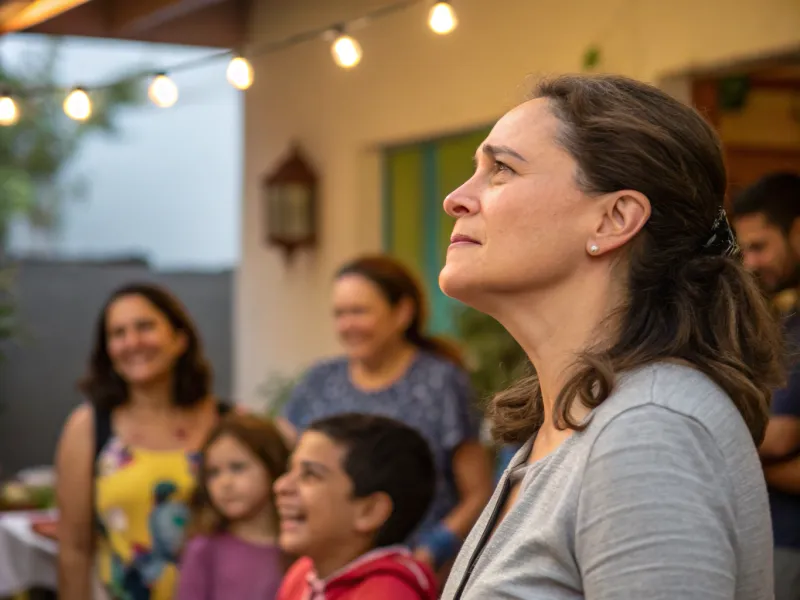35 Surprising Traits People Who Lacked Emotional Support as Kids Often Show

Our childhoods shape us way more than we realize. If you grew up in a home where emotional support was…well, MIA, you might have picked up some habits that still follow you around today.
Maybe you’re the queen of over-apologizing, or maybe you struggle with trusting people (because, duh, past betrayals hit different). Either way, these little quirks and coping mechanisms aren’t random—they’re signs of what you had to do to survive emotionally as a kid.
So, let’s get into it. Here are 35 surprising traits that people who lacked emotional support as kids often show—some funny, some frustrating, and some that might just make you rethink everything. Buckle up, because this one’s gonna be real.
1. Overachiever Extraordinaire

Life And Lessons
Ever wonder why you can’t stop until every single task is perfectly completed? Welcome to the life of an overachiever extraordinaire! Growing up without those essential pats on the back, you’ve developed an insatiable hunger for validation through accomplishment. It’s as if every gold star at work fills a tiny void left from years ago. But here’s the secret sauce: while that drive can power careers to new heights, it can also lead to burnout city if you’re not careful. So, take a breath, and remember: it’s okay to leave some stars uncollected. You’re already more than enough.
Sometimes, it’s about understanding that the world won’t crumble if you take a day off. Those childhood whispers might have told you otherwise, but as an adult, you hold the pen to rewrite that story. Self-worth isn’t tied to productivity, and a little self-love goes a long way in breaking this cycle.
2. The Chronic People-Pleaser

Life And Lessons
Oh, the endless quest to make everyone happy! If you found yourself being the unofficial peacekeeper in your childhood home, this trait might ring a bell or two. Being a people-pleaser feels like second nature, a reflex honed from years of trying to keep the peace to earn love and approval. It’s exhausting, isn’t it? Constantly bending over backward, hoping for that nod of acceptance that seems ever elusive.
The truth? Pleasing everyone is a full-time job with unpaid overtime. Over time, neglecting your own needs can lead to resentment and burnout. Start small: say “no” when you mean it and set boundaries that protect your peace. The world may not always applaud your choices, but genuine friends will respect them. After all, your happiness isn’t a bargaining chip—it’s a birthright.
3. Emotional Independence Overload

Life And Lessons
Here’s to the lone wolves who wear emotional independence like a badge of honor! When emotional support was scarce in childhood, you learned to rely on yourself—sometimes a little too much. This trait can be a strength, showing resilience and self-sufficiency, yet it can also be a wall that keeps others at arm’s length. Being emotionally independent is like being your own best friend, but sometimes even best friends need a break from all that solitude.
It’s okay to let others in, to lean on someone when the weight of the world feels too heavy. Vulnerability isn’t a sign of weakness; it’s a part of human connection that enriches our lives. Next time someone offers a shoulder to lean on, try softening those walls a tad. You might find that the world feels a little warmer with someone by your side.
4. Hyper-Responsibility

Life And Lessons
Meet the master of shouldering responsibility for everyone and everything. If you grew up feeling like you had to be the adult before your time, this one’s for you. Hyper-responsibility can manifest as a need to control outcomes and an overwhelming sense of duty to ensure everyone else is okay. It’s exhausting carrying the weight of the world on your shoulders, isn’t it?
But here’s the thing: it’s not your job to fix everything. You’ve earned the right to share the load and seek support. Life isn’t a solo mission, and those around you can handle their own lives too. Embracing imperfection can be liberating. So, delegate some tasks and give yourself permission to breathe easier. Trust us, the world will keep turning even if you take a step back.
5. Trust Issues Galore

Life And Lessons
Ah, trust—such a simple word yet such a complex reality for many. Growing up without consistent emotional support often breeds a cautious heart. It’s like you’re perpetually waiting for the other shoe to drop. Trust issues can lead to overthinking and second-guessing both yourself and those around you, making relationships a tricky business.
But here’s a little nugget of wisdom: not everyone is out to break your heart or betray your trust. Opening up can feel like handing over the keys to your kingdom, but remember, you’re not alone in this vulnerability thing. Take small steps, and let trust be something that grows organically. You deserve connections that are genuine and fulfilling. It might take time, but you’re worth the effort and so much more.
6. Over-Apologizer Syndrome

Life And Lessons
Sorry this, sorry that—does this sound familiar? Over-apologizing can be a knee-jerk reaction for those who lacked emotional assurance in their formative years. It’s as if you’re constantly preempting someone else’s disappointment or anger, even when you’ve done nothing wrong. Apologies start flowing like a never-ending river, diluting their true significance.
The key here is to recognize when an apology is truly warranted. Practice pausing before you say those words, evaluating if they’re genuinely needed. You’ll find that real apologies, when necessary, carry more weight. It’s perfectly okay to stand your ground and not apologize for existing or having an opinion. Remember, your presence and voice matter, and you don’t need to apologize for taking up space in this world.
7. Perfectionist Pursuit

Life And Lessons
For some, perfection isn’t just a goal; it’s a survival strategy. Growing up without emotional validation can lead to the belief that only perfection will earn acknowledgment and love. So, you strive for flawlessness, but the truth is, perfection is an elusive mirage. It’s not about never making mistakes; it’s about fearing their consequences.
The reality is, imperfection is beautifully human. Mistakes teach us, and they don’t define our worth. Embrace the beauty of a life that’s messy and unpredictable. Letting go of the need for perfection can be liberating, opening doors to creativity and authentic self-expression. So, give yourself a break and cherish the perfectly imperfect journey you’re on. You’re doing just fine, even with a few quirks.
8. The Reluctant Risk-Taker

Life And Lessons
Ah, the paradox of fearing the unknown yet yearning for adventure. If childhood lacked a safety net, taking risks as an adult can feel like stepping into a bottomless pit. It’s understandable why risk-taking feels daunting; the stakes seem higher when you haven’t felt secure in the past.
However, life’s most rewarding experiences often lie on the other side of risk. Embrace the tiny adventures, the calculated risks that bring growth and excitement. Start small and gradually build your confidence in stepping outside your comfort zone. Remember, every leap—big or small—is a testament to your courage. Life is too short to always play it safe, and you have the strength to embrace new challenges with open arms.
9. Avoiding Conflict at All Costs

Life And Lessons
Conflict? No thank you! If your childhood taught you to tiptoe around tensions, you might dread confrontations like the plague. Conflict avoidance becomes a well-practiced art, but it can also lead to unresolved issues and stifled feelings. The irony? Avoiding conflict often creates even more of it.
Learning to face conflict doesn’t mean picking fights; it means addressing disagreements constructively. Practice speaking your truth calmly and assertively, recognizing that it’s okay to disagree. Remember, healthy conflict resolution can strengthen relationships rather than break them. You have the power to express yourself without fear, paving the way for deeper connections and mutual understanding.
10. Overthinking Everything

Life And Lessons
Welcome to the overthinker’s club, where every detail is dissected and analyzed repeatedly. Growing up with inconsistent emotional backing might leave you feeling like you must anticipate every possible outcome. Overthinking can become a hamster wheel of worry, making decisions feel paralyzing.
The key is to recognize when your mind is spiraling and gently guide it back to the present. Ground yourself with mindfulness practices and remind yourself that not every “what if” needs an answer. Trust your instincts—they’re more reliable than you think. By stepping off the mental merry-go-round, you can find peace and clarity in the present moment. Your mind deserves a break from playing out every scenario, and you have the power to give it rest.
11. Sensitivity to Criticism

Life And Lessons
Criticism can feel like a punch in the gut, especially when you’ve grown up without robust emotional support. It’s like every critique echoes with the unmet need for approval from years gone by. Sensitivity to criticism is understandable, yet it can also stifle personal growth and self-expression.
Instead of viewing criticism as a threat, see it as a tool for growth. Not every piece of feedback needs to be internalized; discern what’s constructive and let go of the rest. Remember, you are your own best advocate, and you are allowed to protect your self-esteem. Embrace the compliments as fiercely as you critique yourself, and let them illuminate your path to self-growth.
12. Fear of Abandonment

Life And Lessons
The fear of abandonment can be a lingering shadow for those who lacked emotional support as kids. It’s as if you’re constantly waiting for people to leave, bracing yourself for the inevitable goodbye. This fear can manifest in clinginess or, paradoxically, pushing people away before they can hurt you.
Recognizing this fear is the first step toward healing. Reinforce your sense of self-worth and understand that not every relationship is doomed to end. Open your heart to trust that people can genuinely care without ulterior motives. By fostering self-love and secure connections, you can transform this fear into an opportunity for deeper intimacy and lasting bonds.
13. Difficulty Expressing Emotions

Life And Lessons
Words can feel like elusive butterflies when it comes to expressing emotions, especially if your childhood lacked the emotional vocabulary. Sharing your feelings might feel like exposing a delicate part of yourself, leading to a tight-lipped existence where emotions are bottled up.
It’s essential to remember that emotions are not burdensome; they’re a vital part of being human. Start by acknowledging your feelings, even if it’s just to yourself. Journaling can be a powerful tool to help articulate what’s inside. Gradually, practice sharing with trusted friends or professionals who can offer a safe space. Your voice matters, and expressing your emotions can lead to authentic connections and personal liberation.
14. Emotional Detachment

Life And Lessons
Emotional detachment can feel like an invisible shield, protecting you from the vulnerability of getting hurt. If you didn’t receive emotional support as a child, it might seem easier to keep emotions at bay, creating a serene yet isolated existence.
While emotional detachment can provide temporary relief, it often prevents you from experiencing life’s richness. Allowing yourself to feel, even if it’s uncomfortable, is a courageous step toward emotional freedom. Practice mindfulness and emotional awareness to reconnect with your feelings. Trust that opening up can lead to fulfilling relationships and a deeper understanding of yourself. You’re not alone on this journey, and being open to vulnerability can be a profound strength.
15. High Anxiety

Life And Lessons
Anxiety is no stranger to those who grew up amidst emotional neglect. It’s like an unwelcome guest that lingers, whispering doubts and fears into your ear. The constant state of alertness can be exhausting, making it challenging to relax and enjoy the moment.
Understanding your anxiety is the first step toward managing it. Implement relaxation techniques such as deep breathing, meditation, or yoga to calm your mind. Seeking support from mental health professionals can also provide tools to cope. Remember, anxiety doesn’t define you, and you have the strength to reclaim your peace. It’s okay to ask for help; everyone needs a little support now and then.
16. Intense Loyalty

Life And Lessons
Loyalty is a beautiful trait, but when it becomes intense, it might stem from a deeper need for connection. Growing up without emotional support can lead to forging deep bonds, even when they might not serve your best interest. It’s as if you’re constantly trying to prove your worth through unwavering devotion.
While loyalty is commendable, it’s crucial to ensure it’s mutual and healthy. Reflect on your relationships and ask yourself if they bring joy or drain energy. Remember, loyalty should be a two-way street, nurturing both parties involved. By setting healthy boundaries and valuing yourself, you can balance loyalty with self-respect. Your worth isn’t defined by how much you give, but by how you cherish yourself and those around you.
17. Difficulty Setting Boundaries

Life And Lessons
Setting boundaries can feel like navigating a minefield for those who lacked emotional support in childhood. It’s challenging to say “no” or assert your needs when you’re used to putting others first. The fear of rejection or conflict often keeps boundaries blurry and undefined.
Learning to set boundaries is a powerful act of self-care. Start small, clearly communicating your limits with kindness and firmness. Remember, setting boundaries doesn’t make you selfish; it’s an essential part of maintaining healthy relationships. As you practice, you’ll find that boundaries respect both your needs and those of others. Empower yourself to say “yes” to what aligns with your values and “no” to what doesn’t serve you. You deserve to protect your peace and well-being.
18. Constant Self-Doubt

Life And Lessons
Self-doubt can be an ever-present companion for those who lacked emotional validation growing up. It’s like a shadow that questions every decision and achievement, whispering that you’re never quite enough. This constant questioning can lead to hesitancy and reluctance to pursue your dreams.
To combat self-doubt, practice affirmations that reinforce your strengths and accomplishments. Surround yourself with supportive individuals who recognize your value. Remember, self-doubt is a fear-based narrative that doesn’t define your truth. By challenging these thoughts and celebrating small victories, you can build confidence and trust in yourself. You are capable of greatness, and it’s time to silence the doubt and unleash your potential.
19. Need for Control

Life And Lessons
Control can become a lifeline for those who felt emotionally neglected as children. It’s like building a fortress to protect against chaos and uncertainty. While a little control provides stability, an excessive need might hinder spontaneity and joy.
The key is to recognize when control becomes limiting rather than liberating. Gradually, allow yourself to let go and embrace life’s unpredictability. Trust that not everything requires your oversight, and it’s okay to lean into the unknown. By relinquishing the need for control, you open doors to new experiences and possibilities. Life is an adventure, and sometimes the best moments come from the unexpected. You have the courage to navigate it with grace and resilience.
20. Over-Analyzing Relationships

Life And Lessons
Over-analyzing relationships can feel like a full-time job for those who lacked emotional reassurance in their early years. It’s as if every word and gesture must be decoded for hidden meanings, creating a web of assumptions and doubts.
The antidote to over-analyzing is fostering open communication and trust. Instead of assuming the worst, practice asking for clarity and sharing your feelings. Remember, relationships thrive on honesty and mutual understanding. By letting go of the need to overthink, you make space for genuine connections that nourish your heart and soul. Your relationships deserve authenticity, and you have the power to cultivate them with openness and trust.
21. Difficulty Accepting Compliments

Life And Lessons
Compliments can feel like awkward gifts for those who didn’t grow up with emotional affirmation. It’s as if accepting praise challenges the internal narrative, leading to discomfort and skepticism. Difficulty accepting compliments can hinder self-esteem and personal growth.
The first step in embracing compliments is acknowledging their sincerity. Practice responding with a simple “thank you,” allowing the positive words to sink in. Remember, compliments are reflections of your worth and accomplishments, not exceptions. Over time, accepting praise becomes more natural, bolstering your confidence and self-image. You deserve to recognize your brilliance and let it shine brightly in every facet of your life.
22. Over-Romanticizing the Past

Life And Lessons
Over-romanticizing the past can be a comforting escape for those who felt emotionally neglected. It’s like wrapping yourself in a warm blanket of selective memories, where everything seemed simpler and safer. However, living in the past often prevents you from embracing the present and future.
To break free from this cycle, practice gratitude for the present moment and set intentions for the future. Acknowledge the lessons of the past, but don’t let them define your now. Your story is still unfolding, and it’s filled with endless possibilities. By grounding yourself in the present, you can create new memories that enrich your life. Embrace each moment, for that’s where true joy and growth reside.
23. High Empathy

Life And Lessons
Empathy is a superpower, but when it’s heightened, it can feel overwhelming. Growing up without emotional support often sharpens your ability to sense others’ emotions, sometimes at the expense of your own. It’s as if the emotional energy of those around you becomes your own burden to carry.
The challenge is to balance empathy with self-care. Recognize when you’re absorbing too much and practice setting emotional boundaries. Remember, it’s okay to prioritize your well-being without feeling guilty. Empathy is a gift, and by managing it wisely, you can support others while nurturing your own spirit. You have the strength to care deeply and still protect your heart.
24. Seeking External Validation

Life And Lessons
The quest for external validation can be a relentless pursuit for those who lacked affirmation in childhood. It’s like chasing a mirage, where approval seems just out of reach yet utterly necessary to feel valued.
The key is to cultivate self-validation, recognizing your worth independent of others’ opinions. Practice celebrating your achievements, no matter how small, and affirm your strengths. Remember, your value isn’t dictated by others but by the love and respect you hold for yourself. By nurturing self-esteem, you can find peace in knowing that you’re enough just as you are. Your journey is uniquely yours, and it’s beautiful in every way.
25. Difficulty with Intimacy

Life And Lessons
Intimacy can feel like navigating uncharted waters for those who didn’t grow up with emotional support. It’s as if sharing your inner world is both alluring and terrifying, leading to guarded hearts and hesitancy in relationships.
Building intimacy requires vulnerability and trust. Practice opening up gradually, sharing your thoughts and emotions with someone you trust. Remember, intimacy isn’t about perfection; it’s about connection and understanding. By embracing vulnerability, you pave the way for deeper relationships that enrich your life. Love and intimacy are worth the risk, and you have the courage to embrace them wholeheartedly.
26. Self-Criticism

Life And Lessons
Self-criticism can be relentless for those who didn’t receive emotional validation as children. It’s like having an internal critic that scrutinizes every action and decision, rarely granting approval.
To quiet this critical voice, practice self-compassion and kindness. Remind yourself that perfection is unattainable, and mistakes are part of being human. Celebrate your accomplishments and forgive your missteps. Remember, you are deserving of love and acceptance, imperfections and all. By fostering self-love, you can silence the critic and embrace your authentic self. You are enough, just as you are, and your journey is a testament to your resilience and strength.
27. Reluctance to Ask for Help

Life And Lessons
For those who lacked emotional support, asking for help might feel foreign, as if vulnerability is a sign of weakness. It’s like wearing a cloak of independence even when the weight becomes too much to bear.
The truth is, asking for help is an act of strength and courage. It allows others to support and connect with you, fostering a sense of community and care. Practice reaching out gradually, trusting that it’s okay to rely on others. You don’t have to shoulder everything alone; support is a gift to both giver and receiver. By allowing yourself to ask for help, you open doors to deeper connections and shared experiences.
28. Avoiding Emotional Conversations

Life And Lessons
Emotional conversations can feel like a minefield for those who didn’t receive emotional support growing up. It’s as if every word carries the weight of vulnerability, leading to avoidance and surface-level interactions.
To navigate this, practice approaching emotional conversations with openness and curiosity. Start by expressing your feelings in a safe space, gradually building comfort with deeper discussions. Remember, emotional conversations are opportunities for growth and understanding, not battles to be won. By embracing these dialogues, you create space for authentic connections and meaningful relationships. Your voice and emotions matter, and sharing them can lead to profound healing and connection.
29. Fear of Rejection

Life And Lessons
The fear of rejection can be a pervasive shadow for those who lacked emotional reassurance. It’s as if every no carries the weight of unworthiness, making vulnerability feel like a dangerous gamble.
To overcome this fear, cultivate self-acceptance and resilience. Remember, rejection isn’t a reflection of your worth but a part of life’s experiences. Practice stepping outside your comfort zone, knowing that each no brings you closer to a yes that truly aligns. By embracing vulnerability, you build confidence and open yourself to opportunities and connections. You are worthy of love and acceptance, and each experience is a stepping stone on your journey.
30. Over-Scheduling as a Distraction

Life And Lessons
Keeping busy can become a refuge for those who want to avoid confronting emotional voids. Over-scheduling acts as a distraction, leaving little room for introspection and emotional processing.
To break this cycle, practice mindfulness and create space for self-reflection. Allow yourself to pause and sit with your emotions, recognizing them as valuable teachers. Remember, productivity doesn’t equate to self-worth, and it’s okay to slow down. By creating a balance between activity and rest, you nurture your well-being and open up opportunities for growth and healing. Your journey is unique, and it’s okay to take it one step at a time.
31. Fear of Change

Life And Lessons
Change can feel daunting for those who found comfort in the familiar, even if it wasn’t supportive. It’s as if every change threatens the fragile stability created in childhood.
Embrace change by seeing it as an opportunity for growth and transformation. Practice adaptability and resilience, trusting in your ability to navigate new beginnings. Remember, life is a series of changes, and each one is a chance to create something beautiful. By welcoming change with an open heart, you empower yourself to embrace the future with courage and optimism. You are capable of thriving amidst change, and your strength will guide you through.
32. Avoiding Vulnerability

Life And Lessons
Avoiding vulnerability can feel like a protective shield, guarding against the risk of emotional exposure. For those who lacked emotional support, vulnerability might seem synonymous with danger.
Recognize that vulnerability is a pathway to connection and authenticity. Practice opening up in safe environments, gradually building trust in yourself and others. Remember, vulnerability isn’t a weakness; it’s a testament to your strength and humanity. By embracing vulnerability, you invite deeper connections and enrich your relationships. Your heart is resilient, and sharing it with others can lead to healing and understanding.
33. Over-Preparation for the Future

Life And Lessons
Over-preparing for the future can become a coping mechanism for those who grew up in uncertain environments. It’s like creating a fortress of plans to shield against the unknown.
While planning is valuable, it’s essential to balance it with flexibility and spontaneity. Trust in your ability to navigate whatever comes your way, knowing that not everything can be predicted or controlled. By embracing the present and allowing some room for the unexpected, you open yourself to new possibilities and experiences. Life is an adventure, and it’s okay to let it unfold naturally. You have the wisdom and courage to navigate it with grace.
34. Difficulty Trusting Intuition

Life And Lessons
Trusting intuition can feel elusive for those who didn’t receive emotional affirmation. It’s as if doubting your instincts became a habit, questioning every gut feeling as unreliable.
Begin by acknowledging your intuition as a valuable guide. Practice tuning into your inner voice and listening to its wisdom. Remember, intuition is a reflection of your inner knowledge and experience, not a guess. By honoring your instincts, you empower yourself to make decisions with confidence and clarity. Trust that your intuition is a powerful ally on your journey, guiding you toward what aligns with your true self and desires.
35. Compulsive Need for Routine

Life And Lessons
For those who grew up without emotional stability, routine can feel like an anchor in a turbulent sea. It’s as if every scheduled task provides a sense of control and predictability in an unpredictable world.
While routine offers comfort, it’s important to allow for flexibility and spontaneity. Embrace the unexpected, knowing that life’s best moments often arise from the unplanned. Practice stepping outside your routine, even if just a little, to explore new experiences and opportunities. By balancing routine with openness, you create a life that’s both stable and dynamic. You have the strength to navigate both the expected and the unknown with grace and resilience.
